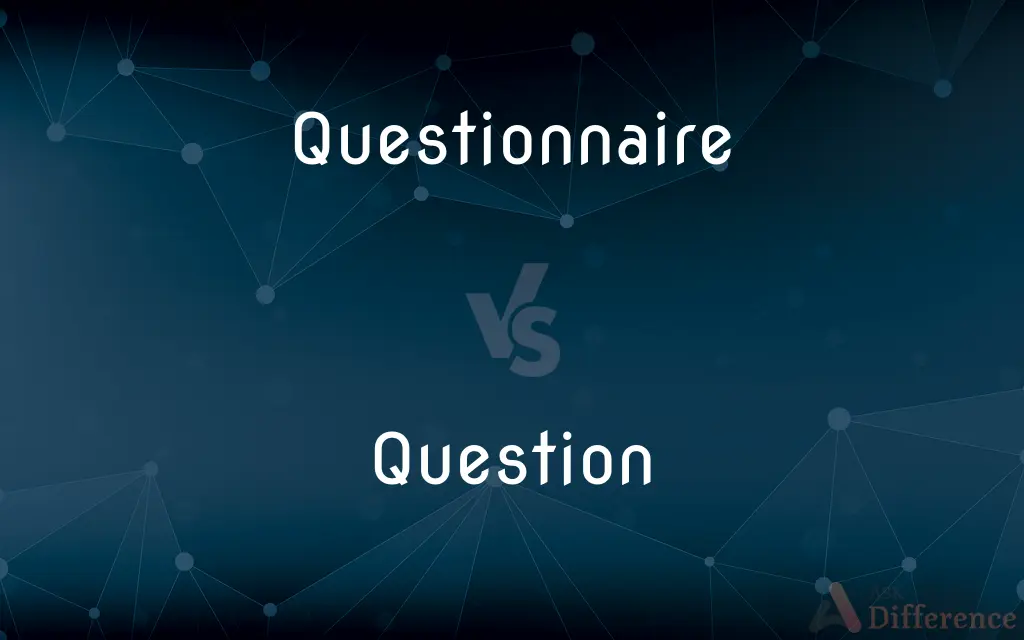Questionnaire vs. Question — What's the Difference?
A questionnaire is a structured set of questions designed for research or survey purposes, while a question is a sentence formulated to elicit information.

Difference Between Questionnaire and Question
Table of Contents
ADVERTISEMENT
Key Differences
A questionnaire is a tool used in research, surveys, or assessments, consisting of a series of questions aimed at gathering information from respondents. It is designed to collect data in a systematic way, allowing for the analysis of opinions, behaviors, or demographic information across a group of people. Questionnaires can be delivered in various formats, including paper, digital, or online forms, and are often used in fields such as market research, psychology, and social sciences.
A question, on the other hand is a sentence or phrase that seeks information through a reply. Questions are fundamental to communication, serving various functions such as eliciting information, clarifying understanding, or provoking thought. They can be open-ended, allowing for detailed responses, or closed-ended, requiring a specific or yes/no answer.
The relationship between questionnaires and questions is intrinsic, as a questionnaire is composed of multiple questions designed to collectively gather comprehensive information on a particular topic. While a question can stand alone or be part of a casual conversation, a questionnaire represents a more formal and structured approach to inquiry, with the purpose of research or systematic data collection.
Both questionnaires and questions are tools for acquiring knowledge, but they operate at different scales and in different contexts. A single question can spark a conversation or lead to insight on a specific issue, whereas a questionnaire aggregates responses from many individuals to draw broader conclusions or inform decision-making processes.
The effectiveness of a questionnaire depends largely on the quality and design of its questions. Well-crafted questions can minimize biases and misunderstandings, leading to more accurate and meaningful data. Conversely, poorly designed questions can result in unreliable or skewed data, affecting the overall outcomes of the research or survey. Thus, the art of questioning, whether in the form of a single query or a structured set within a questionnaire, is critical in the pursuit of knowledge and understanding.
ADVERTISEMENT
Comparison Chart
Definition
A structured set of questions for research or survey purposes.
A sentence formulated to elicit information.
Purpose
To collect data systematically from a group of respondents.
To seek information or clarify understanding.
Format
Can be paper-based, digital, or online.
Verbal or written, standalone or part of a dialogue.
Types
May include open-ended, closed-ended, or multiple-choice questions.
Can be open-ended (detailed response) or closed-ended (specific/yes/no answer).
Context
Used in formal research, surveys, and assessments.
Used in everyday communication, research, and various forms of inquiry.
Compare with Definitions
Questionnaire
Designed with a series of questions.
The health survey questionnaire included both multiple-choice and open-ended questions.
Question
A sentence seeking information.
The student raised a question about the lecture topic.
Questionnaire
A tool for systematic data collection.
The researcher distributed a questionnaire to study consumer behavior.
Question
Can be open or closed-ended.
The interview started with open-ended questions to understand the candidate's experience.
Questionnaire
Can be administered in multiple formats.
Participants completed the online questionnaire about their fitness routines.
Question
Fundamental to communication.
Effective questions led to a deeper discussion in the meeting.
Questionnaire
A questionnaire is a research instrument consisting of a series of questions (or other types of prompts) for the purpose of gathering information from respondents. The questionnaire was invented by the Statistical Society of London in 1838.Although questionnaires are often designed for statistical analysis of the responses, this is not always the case.
Question
Varies in form and context.
The detective asked questions to piece together the events.
Questionnaire
Used in various fields like market research.
Companies use questionnaires to gather feedback on new products.
Question
Elicits responses or clarification.
The teacher's question prompted students to think critically about the subject.
Questionnaire
A form containing a set of questions, especially one addressed to a statistically significant number of subjects as a way of gathering information for a survey.
Question
A sentence, phrase, or gesture that seeks information through a reply.
Questionnaire
A form containing a list of questions; a means of gathering information for a survey.
Carry out a questionnaire
Fill out a questionnaire
Question
A proposal to a meeting as a topic for deliberation.
I move that the question be put to a vote.
Questionnaire
A form containing a set of questions; submitted to people to gain statistical information.
Question
The act of asking; interrogation; inquiry; as, to examine by question and answer.
Questionnaire
Aims to gather comprehensive information.
The questionnaire results will inform the company's marketing strategy.
Question
To ask questions; to inquire.
He that questioneth much shall learn much.
Question
To raise a question about; to call in question; to make objection to.
Common Curiosities
Why is it important to carefully formulate questions?
Careful formulation ensures clarity, minimizes biases, and improves the accuracy and relevance of the information obtained.
How do questionnaires differ from interviews?
Questionnaires are structured tools for written responses, while interviews involve verbal interaction and can adapt questions based on responses.
Can a question be both open-ended and closed-ended?
A question is typically either open-ended, allowing for a detailed response, or closed-ended, requiring a specific or yes/no answer, but not both.
What makes a good question in a questionnaire?
A good question is clear, concise, unbiased, and designed to elicit the intended information effectively.
How are questionnaire responses analyzed?
Responses are analyzed using statistical methods for quantitative data or content analysis for qualitative data, depending on the question types.
What is the main purpose of a questionnaire?
The main purpose of a questionnaire is to collect systematic data from a group of people for research, survey, or assessment purposes.
How does the design of a questionnaire affect its effectiveness?
The design, including question types, wording, and order, affects its effectiveness by influencing the reliability and validity of the responses collected.
Can anyone create a questionnaire?
While anyone can create a questionnaire, designing an effective one requires understanding of research methods and questionnaire design principles.
Can the order of questions in a questionnaire influence responses?
Yes, question order can affect responses due to factors like priming or fatigue, and should be carefully considered in questionnaire design.
What ethical considerations are involved in questionnaire design?
Ethical considerations include ensuring confidentiality, obtaining informed consent, and avoiding sensitive questions that may cause discomfort.
What role do questions play in education?
In education, questions stimulate learning, provoke thought, and assess understanding.
Is it better to use open-ended or closed-ended questions?
The choice depends on the research goals: open-ended questions gather detailed insights, while closed-ended questions facilitate easier analysis and comparison.
What impact do cultural differences have on question formulation?
Cultural differences can impact comprehension and interpretation, necessitating culturally sensitive question formulation to ensure accuracy and relevance.
How do digital questionnaires compare to paper-based ones?
Digital questionnaires offer convenience, easier data management, and potentially higher response rates, while paper-based ones can be accessible to those with limited internet access.
How can a questionnaire be tested for reliability?
Reliability can be tested by pilot testing the questionnaire with a small group and assessing the consistency of responses.
Share Your Discovery

Previous Comparison
Lessor vs. Leaser
Next Comparison
Descend vs. Ascend












































